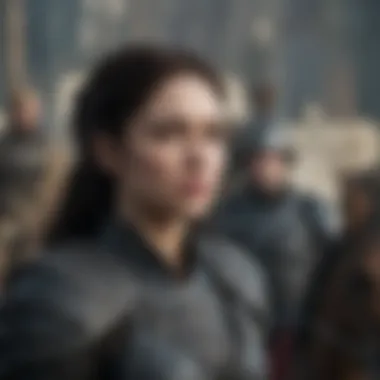A Comprehensive Guide to Watching Game of Thrones Season 2


Intro
In the ever-expanding universe of Game of Thrones, Season 2 marks a significant turning point. Viewers are reintroduced to a world where the stakes are higher and the battles for power intensify. This season continues to explore complex character arcs and intertwining storylines that leave audiences captivated. Before diving into the specifics of how to watch and enhance this experience, it is essential to understand the depth and richness laid out throughout the season.
Viewing options range from popular streaming services such as HBO Max to purchasing physical copies like Blu-rays. Each method of watching has its merits, catering to different preferences in terms of convenience, quality, and accessibility. Furthermore, supplementary materials such as behind-the-scenes content and podcasts add layers to engage with the story beyond just watching episodes.
In this guide, we will cover various aspects that not only include viewing methods but also an analysis of key characters, episode breakdowns, and the lore of Westeros. Whether you are a casual viewer craving a compelling narrative or a die-hard fan aiming to dissect intricate details, this guide provides essential tools to enhance your viewing of Season 2.
Overview of Game of Thrones Season
Understanding Season 2 of Game of Thrones is essential for viewers who wish to dive deeper into the series. It lays the groundwork for ongoing narratives and character evolutions that influence later seasons. This season continues to adapt George R.R. Martin's series of fantasy novels, expanding the intricate world of Westeros, and introducing significant twists that enhance the viewer's engagement.
Synopsis of the Season
Season 2 picks up right after the events of Season 1, as the struggle for the Iron Throne intensifies. Various factions within the realm vie for power, leading to conflicts that reverberate throughout the story arc. The season features notable events such as the Battle of Blackwater, where Stannis Baratheon attempts to seize King’s Landing, showcasing the tactical brilliance of Tyrion Lannister as he defends the capital. This season portrays not just battles but also the personal struggle of key characters, making it much more complex than the fight for the throne alone.
Key Themes and Plot Developments
Several themes emerge prominently in Season 2:
- Power and Ambition: The quest for power remains a critical theme. Various characters, driven by ambition, reveal their moral boundaries.
- Betrayal: Trust is repeatedly broken. Characters face choices that test their loyalties and lead to shocking betrayals.
- The Nature of War: The impacts of war are showcased not only on the battlefield but also on families, allegiances, and innocence.
The plot introduces significant developments, including the emergence of new alliances and enemies, shaping the narrative's future direction.
Character Prefaces and Changes
Season 2 witnesses the introduction of compelling characters such as Brienne of Tarth and Stannis Baratheon. Each character brings unique motivations and traits that enrich the storyline. The character arc of Tyrion Lannister is especially noteworthy; he transforms from a perceived outcast to a formidable player in the political arena. This season also emphasizes changes in relationships, developing character dynamics that will have lasting effects as the series progresses.
In summary, Season 2 not only solidifies existing narratives but also expands the universe through diverse themes and vivid character developments. Understanding these elements enhances the viewing experience, allowing fans to appreciate the complexity of the show.
Where to Watch Game of Thrones Season
Understanding where to watch Game of Thrones Season 2 is crucial for fans who want to immerse themselves fully in the experience. With the shift in how media is consumed, viewers have various methods available. Whether it’s through streaming platforms, purchasing digital copies, or traditional physical media, knowing your options enriches the viewing experience.
Streaming Services Offering Season
For many, streaming services are the most convenient way to watch. Platforms like HBO Max and Hulu enable viewers to catch the entire series, including Season 2. These services usually offer free trials, which can be an excellent way to start watching if you are new. Additionally, subscribing offers the advantage of access to not just Game of Thrones, but also other HBO content. Streaming is a cost-effective and easy option for binge-watching, especially if you can manage subscriptions across multiple services.
Purchasing Digital Copies
If you prefer to own your media, purchasing digital copies can be a wise choice. Platforms such as Amazon Prime Video, iTunes, and Google Play let you buy episodes or full seasons. The benefit here lies in ownership; once purchased, you have the flexibility to watch anytime without needing an active subscription. This is particularly advantageous for fans who plan to rewatch or have an interest in specific episodes from Season 2. Each platform frequently has sales, which can make the acquisition even more appealing.
Physical Media Options
For collectors, physical media remains a popular choice. Blu-ray and DVD box sets of Game of Thrones are widely available. Retailers like Best Buy and Walmart stock them, often including additional features such as deleted scenes and behind-the-scenes documentaries. These extras can greatly enhance your understanding of the production process and give deeper insights into the storytelling. Owning the physical copies also adds to your collection, preserving the series in a tangible way.


Broadcasting Schedule and Networks
If you are interested in traditional viewing methods, checking the broadcasting schedule is essential. While Season 2 originally aired on HBO, recent reruns might still be available on other networks. Local listings can help identify when to tune in for those encore presentations. Watching on television can sometimes offer a different experience, complete with commercials that break up episodes. It can feel nostalgic and engaging to witness the unfolding story as a community, together with fellow viewers.
Enhancing Your Viewing Experience
The experience of watching Game of Thrones Season 2 can be greatly enriched by actively engaging with various resources and communities surrounding the series. As viewers immerse themselves in the intricate plots and character dynamics, understanding how to enhance this experience becomes essential. The right approach not only deepens appreciation for the storytelling but also provides valuable insights that increase enjoyment.
Companion Content and Resources
Companion content plays a crucial role in augmenting the viewing experience. Various resources, such as behind-the-scenes featurettes, episode guides, and podcasts, create an additional layer of context and understanding. For instance, the Game of Thrones official site offers detailed insights into character backgrounds and intricate world-building.
Engaging with such content allows fans to perceive elements they might have missed during the initial viewing. Here are some notable types of companion resources:
- Behind-the-scenes documentaries: These offer glimpses into production, explaining the creative process and how scenes came to life.
- Episode recaps and analyses: Websites like Wikipedia and Britannica have detailed summaries that can clarify complex story arcs or timelines.
- Podcasts: Many fans and experts analyze each episode in depth. This feedback can be quite revealing. For example, community-driven discussions on Reddit bring fresh perspectives and theories.
By exploring these resources, viewers can obtain a richer understanding of each character's motivations and the significance of events portrayed in Season 2.
Engaging with the Community
Joining the broader community of Game of Thrones enthusiasts provides valuable opportunities to exchange thoughts and interpretations. Participating in forums or social media groups leads to enhanced discussions, enriching personal insights. Websites like Facebook host various fan groups that focus on every aspect of the show.
Additionally, engaging with fellow fans offers these benefits:
- Shared experiences: Discussing favorite moments or character developments can create a sense of connection.
- Theories and predictions: Community discussions often result in interesting theories which can enhance anticipation for future episodes.
- Fan art and creative content: Many fans express their creativity through artwork or fan fiction, adding another layer of enjoyment to the viewing experience.
Engaging with the community can transform the solitary act of watching into an inclusive experience, revealing perspectives that might otherwise go unnoticed.
In summary, focusing on enhancing the viewing experience during Game of Thrones Season 2 allows viewers to fully appreciate the depth of the series. Utilizing companion content and engaging with the community are effective strategies that should not be overlooked.
Character Analyses from Season
Analyzing the characters in Season 2 of Game of Thrones provides valuable insight into the overarching narratives and complexities of the series. Each character evolves in response to their environment, relationships, and prevailing themes, making their arcs essential to the viewer's understanding of the story. Highlighting these character developments not only enriches the viewing experience but also allows fans to appreciate the intricacies involved in creating multifaceted personas within the realm of Westeros. This section focuses on the key character arcs and the evolution of relationships while grounding these analyses in the broader context of the season's themes.
Key Character Arcs
In Season 2, the narrative pivots on critical developments in several key characters.
Tyrion Lannister stands out as a central figure. His calculated maneuvers to gain power in King's Landing illustrate a blend of intellect and moral ambiguity. Now serving as Hand of the King, his complex relationship with his family adds depth, revealing his struggles against prejudice due to his stature as a dwarf. The show explores how these challenges shape his decisions and relationships, particularly with Sansa Stark, who appears more vulnerable in the face of political machinations.
Similarly, Jon Snow experiences a significant journey. His commitment to the Night's Watch is tested as he grapples with loyalty and honor. The introduction of characters like Ygritte represents a departure from his rigid ideals. Their relationship complicates his worldview, making him question the very foundation of the Night's Watch's duties.
Daenerys Targaryen also continues to evolve compellingly in this season. Her transformation from a frightened girl to a confident leader is marked by her strenuous efforts to claim her birthright. The acquisition of followers, coupled with her dragons' emerging powers, showcases her gradual ascent as one of the most formidable characters in the series.
Overall, these character arcs are pivotal for establishing the emotional and narrative stakes. Each arc interweaves the personal and the political, amplifying the overarching themes of power, betrayal, and honor.
Character Relationships Evolution
Relationships within Season 2 are fraught with tension, reflecting the series' dramatic undercurrents. A key focus is the dynamic between Ned Stark's children, particularly Robb Stark and Catelyn Stark. Their different outlooks on warfare and familial loyalty create friction. Robb’s alliance decisions lead to significant consequences, showcasing how leadership complicates personal ties.


The thwarted romance between Robb Stark and Jeyne Westerling reveals the harsh realities of the world they inhabit, where love often gets sacrificed on the altar of duty. Likewise, Sansa Stark and Joffrey Baratheon are in the spotlight. Joffrey's cruel behavior towards her underlines the themes of violence and vulnerability, making Sansa’s position increasingly perilous amidst the power struggles.
Furthermore, connections between enemies intensify. The relationship between Cersei Lannister and Ned Stark highlights the interplay of power, mistrust, and the bitter realities of survival, as alliances shift rapidly. Such evolutions are key insights for the audience, showcasing that in Game of Thrones, relationships often hold the ultimate weight of consequences.
Through these character analyses in Season 2, audiences gain a deeper understanding of not only individual motivations but also the intricate web of alliances and enmities that define the political landscape of Westeros.
In essence, dissecting these developments amplifies one's recognition of the narrative's richness and prepares fans for subsequent layers of conflict and resolution in future seasons.
Cinematic Techniques and Production Quality
The world of Game of Thrones is not just crafted through its intricate plots and characters; the cinematic techniques and production quality significantly contribute to the series' impact and appeal. This section will detail several key aspects that elevate the viewing experience of Season 2, offering fans a deeper understanding of how artistry shapes storytelling in this acclaimed series.
Direction and Cinematography
The direction of Game of Thrones plays a crucial role in its storytelling. Directors like David Benioff and D.B. Weiss maintain a strong vision that aligns with George R.R. Martin's narratives. Each episode is carefully crafted to capture the essence of the source material while introducing unique visual storytelling elements. Cinematography, primarily handled by the talented Fabian Wagner for Season 2, enhances every frame's emotional weight.
The use of color grading, camera angles, and lighting all work in tandem to draw viewers into the atmosphere of Westeros. For instance, darker scenes in the Stark territories contrast with the vibrancy of King's Landing, reinforcing the thematic differences between the houses. The sweeping shots of landscapes serve not just as backdrops but also enhance the narrative by conveying the vastness of the world and the stakes involved.
Set Design and Location Scouting
Set design for Game of Thrones is a testament to the show's commitment to authenticity and immersion. Locations were meticulously chosen, from the imposing castle-like structures to the humble abodes of various characters. The production team scouted across Northern Ireland, Iceland, and Croatia, ensuring that each set accurately reflects the series' medieval fantasy aesthetic.
The Castle Ward in Northern Ireland, for example, doubled as Winterfell, allowing for an immersive experience that is visually consistent throughout the seasons. The group of artists and designers, led by Gemma Jackson, imbued the sets with rich detail that breathe life into the narrative. Textures, colors, and layout all contribute to how viewers perceive the environment around their favorite characters, making every scene feel storied rather than just a backdrop.
Costume Design Insights
Costume design in Game of Thrones is another critical aspect of its production quality. The costumes reveal character attributes, allegiances, and even subtle shifts in their psychological landscapes. Michelle Clapton, the series' head costume designer, created attire that is both practical and reflective of the characters’ identities.
From the intricate embroideries on the dresses of the Lannisters to the rugged, layered clothing of the Starks, each outfit communicates much about the individual wearing it. The color palettes represent the various houses and their overarching themes. For instance, the warm tones of House Lannister symbolize wealth and power, while cooler hues in Stark attire reflect their connection to the cold North.
Music and Soundtrack Analysis
The soundtrack of Game of Thrones enhances the overall emotional resonance of key scenes and character arcs. Composed by Ramin Djawadi, the music underscores the gravity of pivotal moments, stirring audiences’ feelings and investments in the storyline. The recurring themes for characters such as Jon Snow and Daenerys Targaryen serve as auditory cues, representing their journeys and transformations.
Each episode is underscored with a thoughtfully curated sound design that captures the brutality and beauty of the fantasy world. Sounds of clashing swords, the ambiance of bustling markets, and haunting melodies in somber moments deepen immersion, impacting how audiences perceive the narrative.
"Music has an uncanny ability to forge connections between the viewer and the story; in Game of Thrones, it's a bridge to character depth and emotional gravitas."
Critical Reception and Audience Feedback
Understanding the critical reception and audience feedback of Game of Thrones Season 2 provides essential insights into its impact and significance. Reviews from critics often influence viewer perceptions and can affect viewership numbers. While audience sentiments reflect the overall enjoyment and engagement with the narrative, both dimensions help to paint a clearer picture of the show's success. This section dives into two main areas: the critiques from professionals and the reactions from fans. Together, they form a comprehensive understanding of how this season was received upon its release.
Reviews and Critique Overview
Game of Thrones Season 2 received a largely positive response from critics, who praised its storytelling and character development. Many reviews highlighted the series' ability to adapt A Clash of Kings, the second book in George R. R. Martin's series. Critics noted the increased complexity of plot lines, which added depth to the viewing experience.
Key elements of critical reviews include:


- Character Depth: Reviewers stated that characters were fleshed out more than in the first season, allowing for more relatable and intriguing arcs.
- Production Quality: The visual aesthetics of the series, including cinematography and set design, garnered commendations for its cinematic quality.
- Plot Progression: Some critiques pointed out that while there were numerous plot threads, they remained engaging without feeling convoluted.
One notable critique came from The Atlantic, which emphasized the shift in tone and pacing, suggesting that the narrative became darker but offered rich character insights. This gave audiences a chance to explore the moral complexities of the characters. The reviews often concluded that Season 2 solidified the series as a cultural phenomenon, making it a must-watch for fantasy enthusiasts.
Fan Reactions and Community Discussions
Fans of Game of Thrones took to forums and social media to express their reactions to Season 2. The discussions often revolved around favorite characters, unexpected plot twists, and memorable quotes from the episodes. Many fans shared their thoughts on platforms like reddit.com and facebook.com, which facilitated lively community exchanges.
Some key aspects of fan reactions include:
- Character Loyalty: Discussions often showed a strong allegiance to certain characters, leading to heated debates about their motivations and outcomes.
- Theories and Predictions: Fans enjoyed speculating about the future of plotlines and character arcs, creating theories that often spanned multiple posts. Such predictions sparked engagements among viewers as theories evolved with each episode.
- Episode Rankings: Many fans felt compelled to rank episodes based on emotional impact, storytelling, or character moments, fostering further discussions about the season's highlights.
The collective voice of the audience serves as an indicator of the show's resonance with its viewers, showing how engaged and invested they were in the unfolding drama. Game of Thrones Season 2 not only entertained but also brought fans together in an intricate network of ideas and dialogues, enhancing the overall viewing experience.
Implications for Future Seasons
Understanding the implications of Season 2 of Game of Thrones is essential for grasping the broader narrative that unfolds in subsequent seasons. This season acts as a pivot point, showcasing choices and conflicts that shape character trajectories and the overarching storyline. By delving into the relationships established and the backstories revealed in this season, viewers can gain insight into the motivations driving characters in the later parts of the series.
The decisions made in Season 2 reverberate beyond the immediate conflict, influencing alliances and enmities. Such dynamics create a framework for later developments, making it clear that seemingly minor events can carry significant weight in the grand scheme. Recognizing these implications enhances the viewing experience by fostering a deeper appreciation for the complex interconnections that Game of Thrones is known for.
How Season Sets Up Future Events
Season 2 lays critical groundwork for events in later seasons. Major developments unfold as we see characters advance in their respective arcs. Political machinations in King’s Landing illustrate the shifting power dynamics, serving as a precursor to the intense confrontations in Seasons 3 and 4. The struggles of Stannis Baratheon, for example, hint at larger battles to come and highlight the personal stakes involved for each character.
Additionally, the emergence of new alliances, such as those between Davos Seaworth and Stannis, signifies potential narratives that will drive the story forward.
In this context, attention to details in character decisions during Season 2 is crucial for predicting their fates. Recognizing the significant events that play out helps viewers understand which threads will continue into future storylines.
Character and Plot Foreshadowing
Foreshadowing is a pivotal element seen throughout Season 2, particularly in how character actions and decisions shape their destinies. The season presents nuanced layers of character development which often allude to their fates in later seasons. For instance, Tyrion Lannister’s rise to power as Hand of the King positions him as a key player in increasingly complex political battles in the future.
The show’s intricate plotting weaves together various character narratives, revealing the consequences of actions taken by characters like Robb Stark and his decisions regarding war and loyalty. These choices echo in the conflicts of subsequent seasons, intensifying viewers’ connection to the story.
"Characters evolve through their experiences, carrying the weight of their past choices into future narratives."
Ultimately, attentive viewers will find that Season 2 is rich with hints and clues that cast a long shadow over subsequent plot lines. By recognizing these elements, fans can enhance their viewing and analytical experiences as they follow the unfolding saga of Game of Thrones.
In summary, Season 2 is not just a collection of events. It is a carefully constructed phase in Game of Thrones that establishes vital connections leading into the future. The role of character development, plot foreshadowing, and the implications of decisions made in this season cannot be overstated. They are fundamental to understanding the tapestry of narratives that follows.
The End
In the realm of television, few shows have left a mark as significant as Game of Thrones. Season 2 builds upon this foundation, presenting a rich tapestry of narratives that deepen viewer engagement. The attraction lies not only in its story but also in how one experiences it.
Final Thoughts on Season Viewing
The conclusion of this guide emphasizes the various methods one can utilize to enhance the viewing experience of Game of Thrones Season 2. The season is a turning point in the series, showcasing pivotal developments in character arcs and plot twists that resonate throughout later seasons. It is essential to consider that the way you watch can alter your perception of these intricate narratives.
For casual viewers, access to diverse platforms like HBO Max, Amazon Prime Video, or physical Blu-rays provides flexibility. Each method caters to different preferences, be it streaming for convenience or collecting physical media for a more tangible experience.
Engaging with the community is also a notable point. Platforms such as Reddit and Facebook foster discussions that heighten the emotional journey of the show. Sharing insights with fellow fans can lead to a deeper appreciation of the subtle nuances within the story.
Ultimately, the goal of watching Game of Thrones Season 2 goes beyond just viewing; it invites an exploration of themes, character motivations, and the cultural impact the series embodies. Your choices in how you watch facilitate this journey into the complex world of Westeros.



